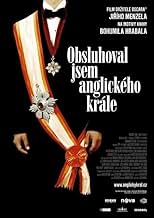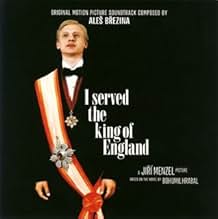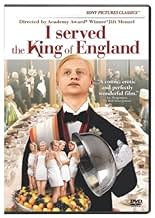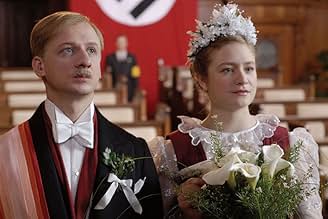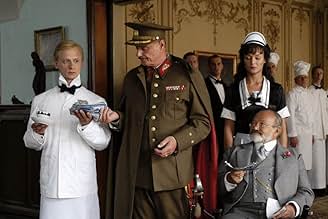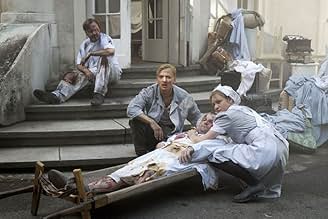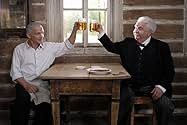IMDb RATING
7.3/10
8.4K
YOUR RATING
A look at the glamorous life at an old-world Prague hotel.A look at the glamorous life at an old-world Prague hotel.A look at the glamorous life at an old-world Prague hotel.
- Awards
- 12 wins & 13 nominations total
- Director
- Writers
- All cast & crew
- Production, box office & more at IMDbPro
Featured reviews
The works of Czech director Jiri Menzel constitute a tasty cocktail of humanism and laughter. In this film, the cocktail is personified in the words spoken by the narrator and lead character early in the film: "It was always my luck to run into bad luck." Menzel's innocent male country bumpkins have simplistic goals in life-get rich and charm the beautiful woman in their horizon. His films remind you of the social satire embedded in the works of Charles Chaplin and the visual gags in the cinema of Buster Keaton. Only Menzel's body of work has a dose of moral ambiguity.
While Menzel's cinema is often mistaken as being solely his own genius, he actually rides on the shoulders of three major literary giants of the former CzechoslovakiaBohumil Hrabal, Vladislaw Vancura, and Zedenek Sverak. Menzel's cinema provides a convenient "easy read." of the fine literary tradition to which Milan Kundera belongs by bringing alive on screen slivers of statements and observations recorded by these novelists. Menzel's true gift is making the written word look attractive on screen with the use of imaginative visual gags. The spoken words (the writer's contribution) and carefully chosen actors serve as the pivot to enjoy the visual feast in Menzel's cinema. His mastery of visual comedy has made a major difference to Czech cinema being associated with comedy rather than drama, quite unlike other East European cinema where tragedies and serious drama overshadowed the comedy genre.
This film happens to be the sixth work of Hrabal that Menzel has adapted on screen-the first being "Closely watched trains."
Politicians find satire uncomfortable. It is not surprising that Hrabal's novel "I served the King of England" was banned for years. When ultimately Menzel made it into a movie in 2006 using Hrabal's script, it won the FIPRESCI prize at Berlin. Menzel's cinema (and Hrabal's novels) has considerable political and social criticism. The film opens with clemency/pardon given to a prisoner who has almost completed his jail term. Communist political bigwigs wish to ape the capitalists, without a clue of what is required to gain social respect. Hrabal's script is clearly critical of the communist regime: "People who said social work was ennobling were the same men who drank all night and ate with lovely young women seated on their knees.' Butlers act superior to their new masters who do not know social etiquette. The new Czech communist politicos bend over backwards to please any one with the remotest Russian credentials. It is no small wonder that Hrabal got into trouble with the authorities until the political regime changed in recent years.
Apart from political criticism, social criticism of Czechs get liberally dished out in the film. When the physically short-statured waiter Jan Dite (literally translated as Johnny Child) throws coins on the floor for fun, rich and poor Czechs crawl without social distinction on the floor to pick up the money, allowing the short-statured waiter to look down at those he was serving and emerge physically and socially "tall" for a brief period. There is another line that Hrabal/Menzel uses to describe Czechs and their actions over the decades "Czechs do not fight warstherefore we were not invaded, we were annexed." These are lines that will make many laugh, but these lines could make the author/ the director unpopular with a few who cannot take self criticism.
The quest for money and riches underpin this film in particular and much of Menzel's cinema. The film has the lead character selling sausages at a railway station. So engrossed is he in counting the change he has to return to a customer who has given him a big bank note, that the train pulls out with the angry customer fuming that he has been cheated. But Hrabal and Menzel had together done a similar scene in "Closely watched trains" where a train pulls out as the young hero is about to kiss his love with eyes closed, taking away his beloved girl whose eyes are open and is agitated that the kiss was missed.
Money is a recurring theme in "I served the King of England." The hero dreams of being a millionaire. One colorful character keeps himself amused spreading out cash on the floor like a carpet. Money is what waiter's get if he is good and smart, enough to buy up the hotel. He gets a medal from an Ethiopian Head of State, modeled on the physical attributes of Haile Selassie; merely because he can bend down to receive it. He gets a fat tip because he is physically near to a rich guest doling out his largesse.
After one has laughed sufficiently, one could reflect on the less obvious but darker side of Hrabal/Menzel's contribution to cinema. The women are lovely to look at. They bear a striking common factorthey are to be won. They are to be used, often as useful commodities. One Nazi girl even makes love, thinking of Hitler during the act. You do not see Hrabal and Menzel developing the women characters as they do their male ones. In this film, the anti-hero is dismissed from his job because he is not a good Czech.
"I served the King of England" are the spoken credentials of a respected waiter in the film as he trains the lead character of the film. Yet, the film is about a successful Czech who became a millionaire as he had dreamt, who married a Nazi and had enjoyed life when other Czechs were being led to the gas chambers, and was imprisoned when the Communists came to power. Hrabal and Menzel may have given us great comedy over six films. Evaluate the content closely and there is more to their work than pure comedy.
While Menzel's cinema is often mistaken as being solely his own genius, he actually rides on the shoulders of three major literary giants of the former CzechoslovakiaBohumil Hrabal, Vladislaw Vancura, and Zedenek Sverak. Menzel's cinema provides a convenient "easy read." of the fine literary tradition to which Milan Kundera belongs by bringing alive on screen slivers of statements and observations recorded by these novelists. Menzel's true gift is making the written word look attractive on screen with the use of imaginative visual gags. The spoken words (the writer's contribution) and carefully chosen actors serve as the pivot to enjoy the visual feast in Menzel's cinema. His mastery of visual comedy has made a major difference to Czech cinema being associated with comedy rather than drama, quite unlike other East European cinema where tragedies and serious drama overshadowed the comedy genre.
This film happens to be the sixth work of Hrabal that Menzel has adapted on screen-the first being "Closely watched trains."
Politicians find satire uncomfortable. It is not surprising that Hrabal's novel "I served the King of England" was banned for years. When ultimately Menzel made it into a movie in 2006 using Hrabal's script, it won the FIPRESCI prize at Berlin. Menzel's cinema (and Hrabal's novels) has considerable political and social criticism. The film opens with clemency/pardon given to a prisoner who has almost completed his jail term. Communist political bigwigs wish to ape the capitalists, without a clue of what is required to gain social respect. Hrabal's script is clearly critical of the communist regime: "People who said social work was ennobling were the same men who drank all night and ate with lovely young women seated on their knees.' Butlers act superior to their new masters who do not know social etiquette. The new Czech communist politicos bend over backwards to please any one with the remotest Russian credentials. It is no small wonder that Hrabal got into trouble with the authorities until the political regime changed in recent years.
Apart from political criticism, social criticism of Czechs get liberally dished out in the film. When the physically short-statured waiter Jan Dite (literally translated as Johnny Child) throws coins on the floor for fun, rich and poor Czechs crawl without social distinction on the floor to pick up the money, allowing the short-statured waiter to look down at those he was serving and emerge physically and socially "tall" for a brief period. There is another line that Hrabal/Menzel uses to describe Czechs and their actions over the decades "Czechs do not fight warstherefore we were not invaded, we were annexed." These are lines that will make many laugh, but these lines could make the author/ the director unpopular with a few who cannot take self criticism.
The quest for money and riches underpin this film in particular and much of Menzel's cinema. The film has the lead character selling sausages at a railway station. So engrossed is he in counting the change he has to return to a customer who has given him a big bank note, that the train pulls out with the angry customer fuming that he has been cheated. But Hrabal and Menzel had together done a similar scene in "Closely watched trains" where a train pulls out as the young hero is about to kiss his love with eyes closed, taking away his beloved girl whose eyes are open and is agitated that the kiss was missed.
Money is a recurring theme in "I served the King of England." The hero dreams of being a millionaire. One colorful character keeps himself amused spreading out cash on the floor like a carpet. Money is what waiter's get if he is good and smart, enough to buy up the hotel. He gets a medal from an Ethiopian Head of State, modeled on the physical attributes of Haile Selassie; merely because he can bend down to receive it. He gets a fat tip because he is physically near to a rich guest doling out his largesse.
After one has laughed sufficiently, one could reflect on the less obvious but darker side of Hrabal/Menzel's contribution to cinema. The women are lovely to look at. They bear a striking common factorthey are to be won. They are to be used, often as useful commodities. One Nazi girl even makes love, thinking of Hitler during the act. You do not see Hrabal and Menzel developing the women characters as they do their male ones. In this film, the anti-hero is dismissed from his job because he is not a good Czech.
"I served the King of England" are the spoken credentials of a respected waiter in the film as he trains the lead character of the film. Yet, the film is about a successful Czech who became a millionaire as he had dreamt, who married a Nazi and had enjoyed life when other Czechs were being led to the gas chambers, and was imprisoned when the Communists came to power. Hrabal and Menzel may have given us great comedy over six films. Evaluate the content closely and there is more to their work than pure comedy.
10sjbrook1
Like the butler played by Anthony Hopkins in the 1994 film "The Remains of the Day", the waiter at the centre of "I Served the King of England" (Jiri Menzel, Czech Republic, 2006) is not interested in politics. Major historical events surround him, yet these completely escape his attention. His ambition is simply to become a millionaire, like the fat cats he serves at table. In 1930s Prague, Hitler, in Berlin, is making a radio announcement about his aim to "liberate" the Sudetenland. Bored, Jan Dite, the waiter, simply turns the dial to a dance music station.
He manages to float through the Nazi invasion, first of the Sudetenland, then of Czechoslovakia. By a combination of hook and crook, he achieves his ambition of owning his own hotel through the sale of valuable stamps, stolen from a vanished Jewish family. This does not give him a moment's pause but later, when he sees a trainload of Jews in cattle-cars moving off to Auschwitz, he has a rush of compassion and chases after the train in an attempt to hand the deportees a sandwich. After the war, as a self-confessed millionaire, he is sent to prison when his hotel is nationalised. He emerges fifteen years later, older, but not much wiser. He is Schweik, but without the latter's sly intelligence.
This sketchy summary cannot do justice to a film which has been described as a near-flawless masterpiece, in which "Prague has never looked better". It is permeated with the ironic wit which marked Menzel's earlier films, such as the Academy Award winning Closely Watched Trains (1966). Dite befriends the German girl Liza, described by one reviewer as "the sweetest little Nazi in the history of the cinema". They are in bed, making love in the missionary position. Liza keeps pushing his head aside so that she can gaze at the big picture of Adolf Hitler on the opposite wall. Such was love in the Third Reich. The scene in which Dite is undergoing a racial fitness test which involves giving a sperm sample is intercut with young Czech men being unloaded from a lorry at an execution ground. Of this, Dite is blissfully unaware.
The Remains of the Day was based on a serious and perceptive novel by Kazuo Ishiguro. The genesis of I Served the King of England, by contrast, was a comic novel by Bohumil Hrabal, a book I cannot wait to get my hands on. Any offers?
He manages to float through the Nazi invasion, first of the Sudetenland, then of Czechoslovakia. By a combination of hook and crook, he achieves his ambition of owning his own hotel through the sale of valuable stamps, stolen from a vanished Jewish family. This does not give him a moment's pause but later, when he sees a trainload of Jews in cattle-cars moving off to Auschwitz, he has a rush of compassion and chases after the train in an attempt to hand the deportees a sandwich. After the war, as a self-confessed millionaire, he is sent to prison when his hotel is nationalised. He emerges fifteen years later, older, but not much wiser. He is Schweik, but without the latter's sly intelligence.
This sketchy summary cannot do justice to a film which has been described as a near-flawless masterpiece, in which "Prague has never looked better". It is permeated with the ironic wit which marked Menzel's earlier films, such as the Academy Award winning Closely Watched Trains (1966). Dite befriends the German girl Liza, described by one reviewer as "the sweetest little Nazi in the history of the cinema". They are in bed, making love in the missionary position. Liza keeps pushing his head aside so that she can gaze at the big picture of Adolf Hitler on the opposite wall. Such was love in the Third Reich. The scene in which Dite is undergoing a racial fitness test which involves giving a sperm sample is intercut with young Czech men being unloaded from a lorry at an execution ground. Of this, Dite is blissfully unaware.
The Remains of the Day was based on a serious and perceptive novel by Kazuo Ishiguro. The genesis of I Served the King of England, by contrast, was a comic novel by Bohumil Hrabal, a book I cannot wait to get my hands on. Any offers?
Obsluhoval jsem anglického krále (Jiří Menzel, 2006, 2h00) is very hard a movie to write on. Obviously, Bohumil Hrabal squares things up with Czech history or nationalism. His main character, brilliantly set up by Jiří Menzel (let's remember "Trains closely watched" and "The Aventures of private Ivan Tchonkin") is a sort of naive though ambitious petty crook, almost reaching his aim transformed into an ideal (becoming a millionaire) until History catch him back, after February 1948.
An older man, though not broken, is opening the movie : Jan is freed after serving 15 years ("which, thanks to amnesty, became 14 years and 9 months") in state prison. We follow older Jan Dite in Sudentenland, now a desert since Germans were expelled after WWII. He remembers his rise - mainly through women, generally whores, caring with him because his charm et his sweetness and invention in bed. This is the center of numerous flash-backs making the bigger part of the film. Nothing wrong to say about musical score, special effects (delicate and charming), casting (all women are beautiful), acting, filming and editing. Everything works, no flaws.
The problem, if there is a problem, lies in the hero and almost all of the characters he is mixed with : all are of a rather repulsively vulgar cynicism, which becomes the philosophy Jan uses to transform his first poor dream into an ideal. And those who are not of this kind are lead by nationalism - narrow minded (the Czechs) or hideous (the Nazi school-mistress Jan falls for). Oddly enough, the only one redeemed for us is the head waiter in Hotel Paris, who is Czech, righteous and courageous. Is it to tone down Hrabal's thesis?
So the whole story looks like an enormous bitter (and sophisticated) farce Menzel filmed on behalf of Hrabal's feelings.
Besides, there is still something in the movie, which make its vision not one-sided : a bitter-sweet taste given by the face of mature if not old men in front of women beauty, and the visible and overwhelming nostalgia this beauty vivify in their mind. They remember, and they smile... Isn't it there some kind of a sketch, the sketch of a how-to-grow-old handbook?
An older man, though not broken, is opening the movie : Jan is freed after serving 15 years ("which, thanks to amnesty, became 14 years and 9 months") in state prison. We follow older Jan Dite in Sudentenland, now a desert since Germans were expelled after WWII. He remembers his rise - mainly through women, generally whores, caring with him because his charm et his sweetness and invention in bed. This is the center of numerous flash-backs making the bigger part of the film. Nothing wrong to say about musical score, special effects (delicate and charming), casting (all women are beautiful), acting, filming and editing. Everything works, no flaws.
The problem, if there is a problem, lies in the hero and almost all of the characters he is mixed with : all are of a rather repulsively vulgar cynicism, which becomes the philosophy Jan uses to transform his first poor dream into an ideal. And those who are not of this kind are lead by nationalism - narrow minded (the Czechs) or hideous (the Nazi school-mistress Jan falls for). Oddly enough, the only one redeemed for us is the head waiter in Hotel Paris, who is Czech, righteous and courageous. Is it to tone down Hrabal's thesis?
So the whole story looks like an enormous bitter (and sophisticated) farce Menzel filmed on behalf of Hrabal's feelings.
Besides, there is still something in the movie, which make its vision not one-sided : a bitter-sweet taste given by the face of mature if not old men in front of women beauty, and the visible and overwhelming nostalgia this beauty vivify in their mind. They remember, and they smile... Isn't it there some kind of a sketch, the sketch of a how-to-grow-old handbook?
Obsluhoval jsem anglického krále (2006), written and directed by Jirí Menzel, is a Czech film shown in the U.S. with the title, "I Served the King of England." Menzel directed "Closely Watched Trains," one of the great movies of the 1960's.
Using flash forwards and flash backs, we follow the life of Jan Díte, played as a young man by Ivan Barnev, and as an older man by Oldrich Kaiser. Díte is obsessed with becoming a millionaire, and the younger Díte manages to accomplish this goal by his total unconcern for the plight of his country and his fellow Czechs.
When the Germans invade Sudetenland, and then the rest of Czechoslovakia, Díte takes it all in stride, calmly embracing--figuratively--the Nazi invaders and--literally--a lovely young Nazi woman. I think we are supposed to perceive him as naive and innocent, but my interpretation is that he is willfully ignorant and basically uncaring. My mother always said, "There are none so blind as those who will not see." That quote perfectly fits Díte's character.
The film has some comic moments, and the views of Prague are lovely. The movie is worth watching if the opportunity arises, but not worth strenuously seeking out. We saw it at the Rochester High Falls International Film Festival. It will work well on DVD.
Using flash forwards and flash backs, we follow the life of Jan Díte, played as a young man by Ivan Barnev, and as an older man by Oldrich Kaiser. Díte is obsessed with becoming a millionaire, and the younger Díte manages to accomplish this goal by his total unconcern for the plight of his country and his fellow Czechs.
When the Germans invade Sudetenland, and then the rest of Czechoslovakia, Díte takes it all in stride, calmly embracing--figuratively--the Nazi invaders and--literally--a lovely young Nazi woman. I think we are supposed to perceive him as naive and innocent, but my interpretation is that he is willfully ignorant and basically uncaring. My mother always said, "There are none so blind as those who will not see." That quote perfectly fits Díte's character.
The film has some comic moments, and the views of Prague are lovely. The movie is worth watching if the opportunity arises, but not worth strenuously seeking out. We saw it at the Rochester High Falls International Film Festival. It will work well on DVD.
Maybe, like me, you don't know that much about the history of the country wherein sits Prague, and its remnants of regal splendour. After watching I Served the King of England, you will know more. A lot more. The politics. The humour. The cultures. The aspirations. The troubled relations with neighbouring empires. And the incredible resilience of its individuals.
I Served the King of England is very ambitious. It condenses an epic novel into two hours and squeezes in more styles than a catwalk. There are nods to the wit of Charlie Chaplin. The visual eulogies of Peter Greenaway. Penitentiaries, bars, brothels, woods, invading armies. All are collected in a dizzying montage as Jan Díte reviews the highs and lows of his life and loves in flashback.
He has just been released from Prague Correctional Facility, having served almost 15 years. He is also in rather humble circumstances. This seems to contrast with his lifelong and apparently successful ambition to become a millionaire. The first half of the film has a theatrical feel of unreality much like a musical. Serving lad Díte manages to score with a local beauty at the nearby bordello. He then get various jobs that involve him working with sophisticated women of pleasure, or in top hotels, or sometimes both together. His short stature enables him to play many tricks, like surreptitiously throwing a handful of coins on the ground for the pleasure of watching rich men get down on their hands and knees with their bums in the air. One of his favourite penchants with the ladies, on the other hand, is to ornament their naked and prostrate forms with anything from flowers, to fruit, to funds from his growing pocket book. One particularly striking moment is when he decorates a naked brothel girl (who looks worryingly like Kylie Minogue) in large margarita daisies. The scene is as arresting as the nude-and-rose-petals shot in American Beauty, or the female-served-for-dinner in The Cook The Thief His Wife & Her Lover.
Menzel's taste for a decadent protagonist is in no way sullied by shame. His whores are creatures of beauty: "The scent of raspberry trailed behind her. She stepped out in that silk dress, full of peonies, and bees hovered around her like a Turkish honey store." ('Bees' you will note, not 'flies'.) The description follows an incident where the lady in question pours raspberry grenadine over herself - to stop Díte from getting into trouble.
I Served the King of England soon becomes rife with political and social comment, even before we get to the eponymous and very loaded comment by Díte's boss boasting his resumé. Having treated us to sumptuous society, the film reminds us of the cost: "I discovered that those who said 'work is ennobling' were the same men who drank all night and ate with lovely young ladies seated on their knees." The palatial buildings, over-refined manners and ostentatious egregiousness of old Europe belie the fabled shangrila on which they are modelled. As we witness the Nazi and then Communist take-overs, the film touches on many issues that have affected the creation and difficult continuation of the country now known as the Czech Republic. Amusingly, the Nazi ideal of 'racial purity' enables Díte to continue his lifestyle - his German fiancé secures him a job at a breeding ground for top military studs.
The best parts of the film are full of beauty and sadness. An old man reminisces: "We, in the 20th century, are inclined to see the glory in ourselves and the shame in others that's how the mess got started." The latter half of the film gradually becomes more serious in tone, even didactic. Here is your history lesson, insight into human nature, poetry and great literary adaptation all in one, it seems to be saying to us.
I Served the King of England is a film on an enormous scale. It makes a valiant attempt to be a masterpiece, but feels as if it didn't have quite enough time to display its flaunted genius. One cannot help but admire it. Even if it doesn't quite reach the dizzying heights to which it aspires.
I Served the King of England is very ambitious. It condenses an epic novel into two hours and squeezes in more styles than a catwalk. There are nods to the wit of Charlie Chaplin. The visual eulogies of Peter Greenaway. Penitentiaries, bars, brothels, woods, invading armies. All are collected in a dizzying montage as Jan Díte reviews the highs and lows of his life and loves in flashback.
He has just been released from Prague Correctional Facility, having served almost 15 years. He is also in rather humble circumstances. This seems to contrast with his lifelong and apparently successful ambition to become a millionaire. The first half of the film has a theatrical feel of unreality much like a musical. Serving lad Díte manages to score with a local beauty at the nearby bordello. He then get various jobs that involve him working with sophisticated women of pleasure, or in top hotels, or sometimes both together. His short stature enables him to play many tricks, like surreptitiously throwing a handful of coins on the ground for the pleasure of watching rich men get down on their hands and knees with their bums in the air. One of his favourite penchants with the ladies, on the other hand, is to ornament their naked and prostrate forms with anything from flowers, to fruit, to funds from his growing pocket book. One particularly striking moment is when he decorates a naked brothel girl (who looks worryingly like Kylie Minogue) in large margarita daisies. The scene is as arresting as the nude-and-rose-petals shot in American Beauty, or the female-served-for-dinner in The Cook The Thief His Wife & Her Lover.
Menzel's taste for a decadent protagonist is in no way sullied by shame. His whores are creatures of beauty: "The scent of raspberry trailed behind her. She stepped out in that silk dress, full of peonies, and bees hovered around her like a Turkish honey store." ('Bees' you will note, not 'flies'.) The description follows an incident where the lady in question pours raspberry grenadine over herself - to stop Díte from getting into trouble.
I Served the King of England soon becomes rife with political and social comment, even before we get to the eponymous and very loaded comment by Díte's boss boasting his resumé. Having treated us to sumptuous society, the film reminds us of the cost: "I discovered that those who said 'work is ennobling' were the same men who drank all night and ate with lovely young ladies seated on their knees." The palatial buildings, over-refined manners and ostentatious egregiousness of old Europe belie the fabled shangrila on which they are modelled. As we witness the Nazi and then Communist take-overs, the film touches on many issues that have affected the creation and difficult continuation of the country now known as the Czech Republic. Amusingly, the Nazi ideal of 'racial purity' enables Díte to continue his lifestyle - his German fiancé secures him a job at a breeding ground for top military studs.
The best parts of the film are full of beauty and sadness. An old man reminisces: "We, in the 20th century, are inclined to see the glory in ourselves and the shame in others that's how the mess got started." The latter half of the film gradually becomes more serious in tone, even didactic. Here is your history lesson, insight into human nature, poetry and great literary adaptation all in one, it seems to be saying to us.
I Served the King of England is a film on an enormous scale. It makes a valiant attempt to be a masterpiece, but feels as if it didn't have quite enough time to display its flaunted genius. One cannot help but admire it. Even if it doesn't quite reach the dizzying heights to which it aspires.
Did you know
- TriviaThe scenes for the Hotel Pariz restaurant were filmed in the main restaurant in Prague's Obecni Dum (Civic House), just around the corner from the actual Hotel Pariz. Both restaurants were designed in the Art Nouveau style by artist Alphons Mucha, but the Obecni Dum restaurant is larger.
- GoofsJan sees a train full of people being deported to a concentration camp. A closeup of one of the cars shows men within wearing gray and white striped uniforms. However, deportees were sent to the camps wearing their civilian clothes and weren't issued uniforms until after they arrived.
- Quotes
Jan Díte, older: A person becomes most human, often against his own will, when he begins to founder, when he is derailed and deprived of order.
- ConnectionsEdited into CzechMate: In Search of Jirí Menzel (2018)
- How long is I Served the King of England?Powered by Alexa
Details
- Release date
- Countries of origin
- Official sites
- Languages
- Also known as
- I Served the King of England
- Filming locations
- Production companies
- See more company credits at IMDbPro
Box office
- Budget
- CZK 84,450,000 (estimated)
- Gross US & Canada
- $617,403
- Opening weekend US & Canada
- $53,218
- Aug 31, 2008
- Gross worldwide
- $7,354,478
- Runtime1 hour 53 minutes
- Color
- Sound mix
- Aspect ratio
- 1.85 : 1
Contribute to this page
Suggest an edit or add missing content

Top Gap
By what name was Moi qui ai servi le roi d'Angleterre (2006) officially released in Canada in English?
Answer

